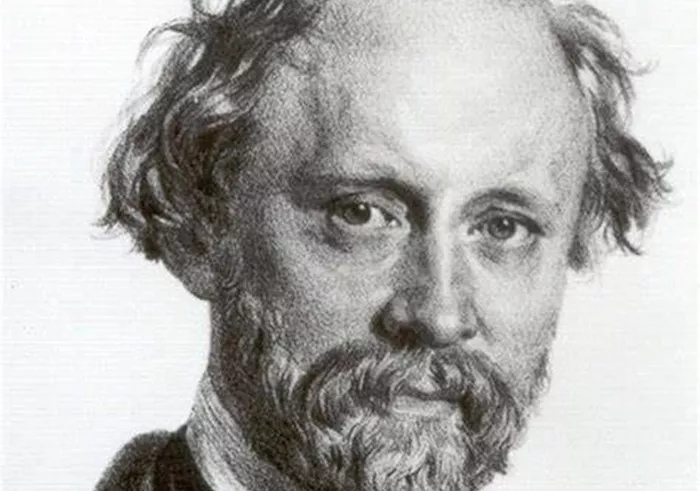Friedrich Hebbel (1813–1863) was a significant figure in 19th-century German poetry and drama. Known for his philosophical depth and tragic themes, Hebbel contributed to German literature with works that explored human destiny, morality, and existential struggles. Unlike his contemporaries, such as Heinrich Heine and Eduard Mörike, Hebbel’s poetry and plays reflected a stark realism mixed with idealistic undertones. His writing shaped German poetry and theater, leaving a lasting legacy that continues to be studied and appreciated.
Friedrich Hebbel
Born on March 18, 1813, in Wesselburen, a small town in the Duchy of Holstein, Friedrich Hebbel came from a modest background. His early years were marked by hardship, as his father, a mason, struggled to provide for the family. Despite financial difficulties, Hebbel displayed a remarkable aptitude for literature. He initially worked as a clerk while nurturing his literary ambitions. Encouraged by patrons, he pursued studies in Hamburg before attending the University of Heidelberg, where he was exposed to philosophy, history, and classical literature.
Literary Career and Themes
Hebbel’s early poetry exhibited an introspective and melancholic tone, influenced by German Romanticism. However, he gradually distanced himself from the idealism of Romantic poets such as Novalis and Joseph von Eichendorff. Instead, his works took on a more tragic and philosophical dimension, reflecting the influence of German Idealist philosophy, particularly Hegelian dialectics.
One of his defining characteristics as a 19th-century German poet was his focus on the inevitable conflict between the individual and the larger forces of society and fate. His poetry often depicted human suffering and the limitations imposed by social and historical conditions.
Comparison with Contemporary German Poets
During the 19th century, German poetry saw the coexistence of different literary movements. Heinrich Heine, for instance, infused his poetry with wit, irony, and political critique, standing in contrast to Hebbel’s solemn and tragic style. Similarly, Eduard Mörike, a contemporary, leaned towards lyrical and delicate expressions, differing from Hebbel’s focus on existential struggles.
Hebbel’s works, unlike those of the late Romantics, were marked by a philosophical rigor that aligned with the emerging Realist movement. While poets such as Ludwig Uhland and Annette von Droste-Hülshoff retained Romantic elements, Hebbel explored themes of historical necessity, human suffering, and destiny in a manner that was more aligned with tragic drama than lyrical poetry.
Major Works
Judith (1840)
One of Hebbel’s most notable early works is the tragedy Judith, which established him as a leading playwright. This play retells the biblical story of Judith and Holofernes, emphasizing psychological depth and moral dilemmas. The language and structure reflect his poetic sensibilities, making it a significant contribution to both German poetry and drama.
Maria Magdalena (1844)
This play, often considered his masterpiece, presents the tragic consequences of rigid social norms and moral expectations. Unlike the Romantic idealism found in other 19th-century German poets, Hebbel’s Maria Magdalena offers a stark and almost naturalistic portrayal of middle-class life, highlighting the oppressive nature of societal conventions.
Nibelungen Trilogy (1861)
Inspired by the Germanic Nibelungenlied, Hebbel’s Nibelungen Trilogy reinterprets the ancient saga with a tragic and philosophical perspective. This work not only showcases his talent as a dramatist but also reveals his poetic ability in shaping grand historical narratives.
Influence on German Poetry and Drama
Hebbel’s literary contributions went beyond his own works. His approach to tragedy influenced later playwrights and poets, including Gerhart Hauptmann and the Naturalist movement. His philosophical treatment of fate and individual agency resonated with themes later explored in modern German literature.
Unlike poets who adhered strictly to aestheticism or political engagement, Hebbel maintained a balance between personal, philosophical, and social concerns. This made him a unique voice among 19th-century German poets.
Conclusion
Friedrich Hebbel remains an important figure in German literature. His contributions to 19th-century German poetry and drama continue to be recognized for their depth and philosophical insight. While his contemporaries explored lyricism, humor, or Romantic nostalgia, Hebbel carved a distinct path, emphasizing the tragic conflicts inherent in human existence. His legacy endures through his plays and poetry, which still provoke thought and admiration in literary circles today.

